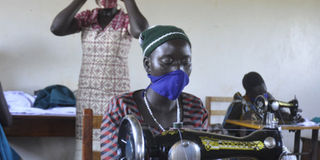Prime
Adjumani refugees make facemasks for themselves

Women who were trained in tailoring make masks at Pagirinya Refugee Settlement Camp at the weekend. PHOTO / TOBBIAS JOLLY OWINY
South Sudanese refugees residing in the 19 different refugee settlements in Adjumani District have embarked on the production of facemasks for themselves in order to fight the spread of Covid-19.
On Saturday, the Office of the Prime Minister (OPM) and United Nations High Commission for Refugees launched the distribution of the locally made facemasks to 35,000 refugees aged 6 and above at Pagirinya Refugee Settlement Camp.
Ms Felicitas Nebril, the head of UNHCR sub-office in Adjumani, said the initiative is meant to enable refugees move freely and participate in the socio-economic development of the country.
“For refugees to be able to comply with the presidential directive on fighting Covid-19, OPM, UNHCR and Terra-Renaissance and other partners embarked on the production of home-made facemasks under the guidance of the Ministry of Health and World Health Organisation,” Ms Nebril said.
She said 2,002 refugee tailors trained by Terra Renaissance and World Vision were mobilised and are participating in the production of the masks across the refugee camps.
“A total of 175,886 facemasks will be distributed to refugees in all their facilities in Adjumani District. We are doing it on the principle of; for the refugees and by the refugees,” Ms Nebril said.
Mr Shingo Ogawa, the Terra Renaissance head of office, said they trained the refugee tailors through a self-reliance initiative project in 2018 and 2019, but were regrouped to make facemasks three months ago.
“At Pagirinya Refugee Settlement, they make masks of three-layers with 100 per cent cotton fabric, specifically designed to ease breathing. Each of us has a target of making a maximum of 100 masks and they have made for nearly a month now since UNHCR approved the design,” he said.
The tailors are provided with the materials and are paid a modest fee to support their families.
Mr Titus Jogo, the refugee desk officer at Adjumani, said by mid-July, all refugees in the district aged six and above will be able to get the facemasks.
Mr James Leku, the Adjumani District chairperson, appealed to UNHCR to ensure additional masks are made for the host communities.
“We applaud these refugees for their efforts and because they have the capacity, we call upon UNHCR and OPM to fund the production of more facemasks for the host community so that we can fill the gap of 40,000 masks that remained while we distributed the government masks,” Mr Leku said.
He urged the refugee welfare councils to ensure the masks are distributed without discrimination.
Covid-19 cases
Infections
Uganda has more than 870 Covid-19 confirmed infections with 54 cases from Adjumani District. According to the district health office, 50 of the cases were registered from refugee settlements.
The infections have been attributed to the inter-settlement movement by refugees and illegal entry of people from South Sudan.
Dr George Bhoka, the Adjumani District health officer, warned that unless illegal entries of South Sudan nationals are tackled by government, cases of infections will continue to rise in the district.
“Unless this is addressed, our efforts to fight infections will remain frustrated,” Dr Bhoka said.



